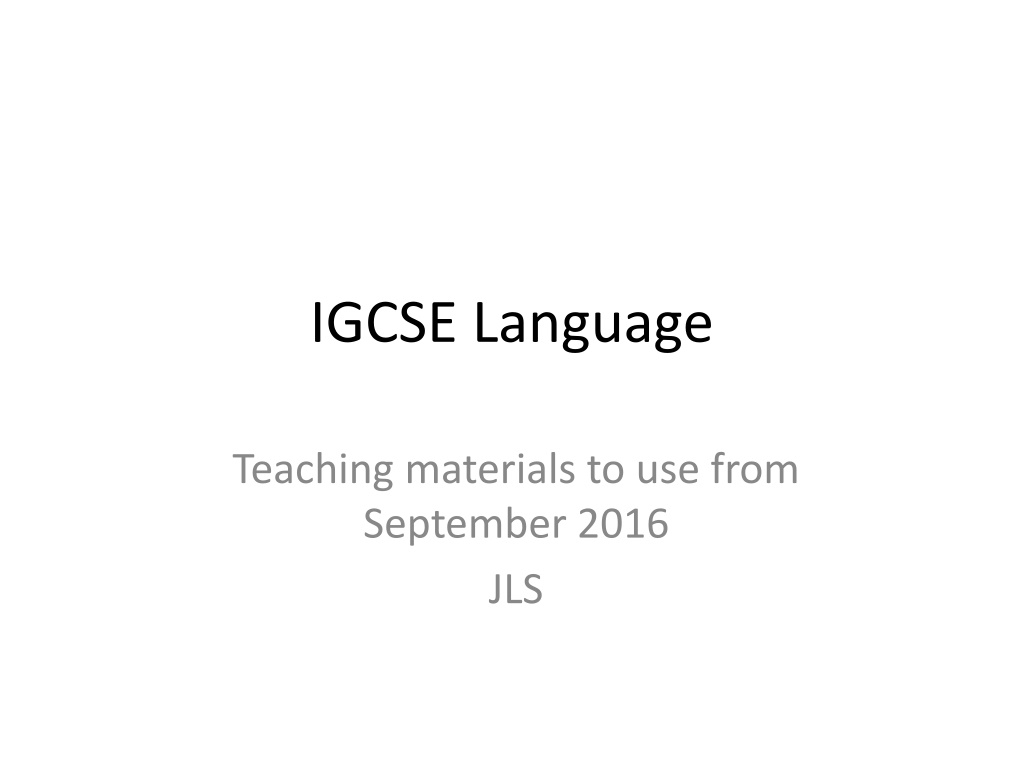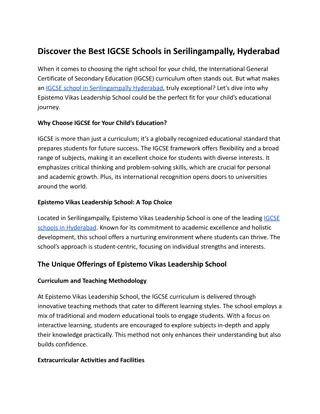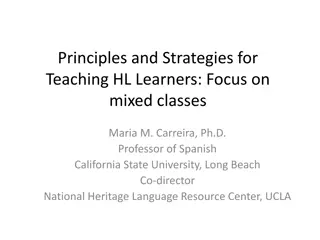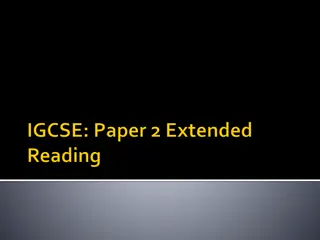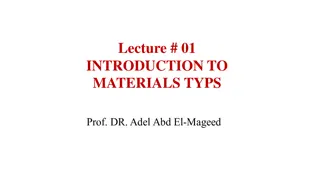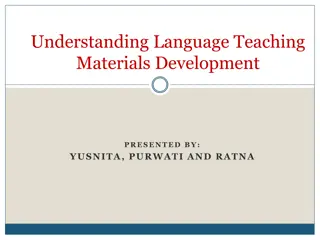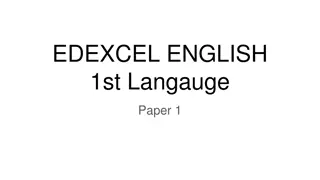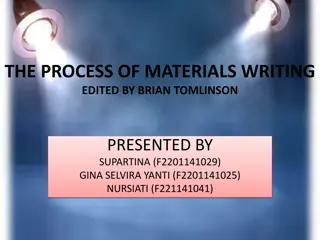IGCSE Language Teaching Materials Overview
This overview covers the assessment papers, content details, and anthology information for IGCSE Language teaching materials to be used from September 2016 at John Lyon School. It includes details on assessment criteria, text analysis, imaginative writing, and the Benjamin Zephaniah anthology. Students will engage with non-fiction, poetry, and prose texts to develop their language skills across various writing styles and themes.
Download Presentation

Please find below an Image/Link to download the presentation.
The content on the website is provided AS IS for your information and personal use only. It may not be sold, licensed, or shared on other websites without obtaining consent from the author.If you encounter any issues during the download, it is possible that the publisher has removed the file from their server.
You are allowed to download the files provided on this website for personal or commercial use, subject to the condition that they are used lawfully. All files are the property of their respective owners.
The content on the website is provided AS IS for your information and personal use only. It may not be sold, licensed, or shared on other websites without obtaining consent from the author.
E N D
Presentation Transcript
IGCSE Language Teaching materials to use from September 2016 JLS
Assessment Paper 1: Non-fiction and Transactional Writing *Paper code 4EA1/01 Externally assessed First assessment: June 2018 60% of the total Content summary the contemporary non-fiction texts from Part 1 of the Pearson Edexcel International GCSE English Anthology. develop skills to analyse how writers use linguistic and structural devices to achieve their effects. explore links and connections between writers ideas and perspectives. develop transactional writing skills for a variety of purposes and audiences use spelling, punctuation and grammar accurately. Assessment Section A: Reading - a mixture of short- and long-answer questions related to a nonfiction text from the Pearson Edexcel International GCSE English Anthology and one previously unseen extract. Total of 45 marks. Section B: Transactional Writing - one 45-mark writing task, from a choice of two involving a given audience, form or purpose. The total number of marks available is 90. The assessment duration is 2 hours 15 minutes. Students will be provided with the anthology text in the examination
Assessment Paper 2: Poetry and Prose Texts and Imaginative Writing *Paper code 4EA1/02 Externally assessed from June 2018 40% of the total Content summary the poetry and prose texts from Part 2 of the Pearson Edexcel International GCSE English Anthology develop skills to analyse how writers use linguistic and structural devices to achieve their effects develop imaginative writing skills to engage the reader use spelling, punctuation and grammar accurately. Assessment Section A: Reading: one 30-mark essay question on a poetry or prose text from the Pearson Edexcel International GCSE English Anthology. Section B: Imaginative Writing - one 30-mark imaginative writing task from a choice of three. The total number of marks available is 60. The assessment duration is 1 hour and 30 minutes. Students will be provided with the anthology text in the examination.
Anthology: Benjamin Zephaniah The John Lyon School Autumn 2016
Starter: what is this passage about? I m of the generation teachers didn t know what was. The big problem with the system then education was that was no passioncom, no understanding and no humanity. I don t back and teachers feel angry with the. The ones who wanted to have an indidiviual apoach weren t allowed to. The idea of being kind and thoughtful and listening to problems just wasn t done: the past is a different kind of country. At school my always contradictedideas the teachers . I remember one that human beings sleep for third of their life and I put my handup said, If there s a isn t design that a fault? If you ve built something, you want. If I was God I would have desigsleep so we could stay awake. Then goo people could do one- third more good in the world. The teacher said, Shut up, stupid boy. Bad wouldo one-third more bad. I I d put in a good thought idea. I was just crative being. She also had a point, but the thing was, she called me stupid for even about it. I reber a kingtal about Africa teacher and the local savages and would say, Who are you to talk about savages? She How dare you challenge me? would say, and that would get me into trouble. Question: how does it make you feel, trying to interpret this? If every piece of writing looked like this, how would it effect your learning, and your attitude to reading?
NB that isn t actually how writing looks to dyslexics, but it s intended to get you thinking about how difficult it might be.
Young and dyslexic? Youve got it going on Benjamin Zephaniah JLS Autumn 2016
Young and dyslexic? Youve got it going on Benjamin Zephaniah I m of the generation where teachers didn t know what dyslexia was. The big problem with the education system then was that there was no compassion, no understanding and no humanity. I don t look back and feel angry with the teachers. The ones who wanted to have an individual approach weren t allowed to. The idea of being kind and thoughtful and listening to problems just wasn t done: the past is a different kind of country. At school my ideas always contradicted the teachers . I remember one teacher saying that human beings sleep for one-third of their life and I put my hand up and said, If there s a God isn t that a design fault? If you ve built something, you want efficiency. If I was God I would have designed sleep so we could stay awake. Then good people could do one-third more good in the world. The teacher said, Shut up, stupid boy. Bad people would do one-third more bad. I thought I d put in a good idea. I was just being creative. She also had a point, but the thing was, she called me stupid for even thinking about it. I remember a teacher talking about Africa and the local savages and I would say, Who are you to talk about savages? She would say, How dare you challenge me? and that would get me into trouble. Once, when I was finding it difficult to engage with writing and had asked for some help, a teacher said, It s all right. We can t all be intelligent, but you ll end up being a good sportsperson, so why don t you go outside and play some football? I thought, Oh great , but now I realise he was stereotyping me. I had poems in my head even then, and when I was 10 or 11 my sister wrote some of them down for me. When I was 13 I could read very basically but it would be such hard work that I would give up. I thought that so long as you could read how much the banknote was worth, you knew enough or you could ask a mate. I got thrown out of a lot of schools, the last one at 13. I was expelled partly because of arguing with teachers on an intellectual level and partly for being a rude boy and fighting. I didn t stab anybody, but I did take revenge on a teacher once. I stole his car and drove it into his front garden. I remember him telling us the Nazis weren t that bad. He could say that in the classroom. When I was in borstal I used to do this thing of looking at people I didn t want to be like. I saw a guy who spent all his time sitting stooped over and I thought, I don t want to be like that, so I learned to sit with a straight back. Being observant helped me make the right choices. A high percentage of the prison population are dyslexic, and a high percentage of the architect population. If you look at the statistics, I should be in prison: a black man brought up on the wrong side of town whose family fell apart, in trouble with the police when I was a kid, unable to read and write, with no qualifications and, on top of that, dyslexic. But I think staying out of prison is about conquering your fears and finding your path in life.
Zephaniah, cont. When I go into prisons to talk to people I see men and women who, in intelligence and other qualities, are the same as me. But opportunities opened for me and they missed theirs, didn t notice them or didn t take them. I never thought I was stupid. I didn t have that struggle. If I have someone in front of me who doesn t have a problem reading and writing telling me that black people are savages I just think, I m not stupid you re the one who s stupid. I just had self-belief. For my first book I told my poems to my girlfriend, who wrote them down for me. It really took off, especially within the black community. I wrote wid luv for with love . People didn t think they were dyslexic poems, they just thought I wrote phonetically. At 21 I went to an adult education class in London to learn to read and write. The teacher told me, You are dyslexic, and I was like, Do I need an operation? She explained to me what it meant and I suddenly thought, Ah, I get it. I thought I was going crazy. I wrote more poetry, novels for teenagers, plays, other books and recorded music. I take poetry to people who do not read poetry. Still now, when I m writing the word knot , I have to stop and think, How do I write that? I have to draw something to let me know what the word is to come back to it later. If I can t spell question I just put a question mark and come back to it later. When I look at a book, the first thing I see is the size of it, and I know that s what it s like for a lot of young people who find reading tough. When Brunel University offered me the job of professor of poetry and creative writing, I knew my students would be officially more educated than me. I tell them, You can do this course and get the right grade because you have a good memory but if you don t have passion, creativity, individuality, there s no point. In my life now, I find that people accommodate my dyslexia. I can perform my poetry because it doesn t have to be word perfect, but I never read one of my novels in public. When I go to literary festivals I always get an actor to read it out for me. Otherwise all my energy goes into reading the book and the mood is lost. If someone can t understand dyslexia it s their problem. In the same way, if someone oppresses me because of my race I don t sit down and think, How can I become white? It s not my problem, it s theirs and they are the ones who have to come to terms with it. If you re dyslexic and you feel there s something holding you back, just remember: it s not you. In many ways being dyslexic is a natural way to be. What s unnatural is the way we read and write. If you look at a pictorial language like Chinese, you can see the word for a woman because the character looks like a woman. The word for a house looks like a house. It is a strange step to go from that to a squiggle that represents a sound. So don t be heavy on yourself. And if you are a parent of someone with dyslexia don t think of it as a defect. Dyslexia is not a measure of intelligence: you may have a genius on your hands. Having dyslexia can make you creative. If you want to construct a sentence and can t find the word you are searching for, you have to think of a way to write round it. This requires being creative and so your creativity muscle gets bigger. Kids come up to me and say, I m dyslexic too, and I say to them, Use it to your advantage, see the world differently. Us dyslexic people, we ve got it going on we are the architects. We are the designers. It s like these kids are proud to be like me and if that helps them, that is great. I didn t have that as a child. I say to them, Bloody non-dyslexics who do they think they are? Related: I was diagnosed with dyslexia and it s a gift, not a curse Related: Dyslexic entrepreneurs why they have a competitive edge
Young and dyslexic? Zephaniah I m of the generation where teachers didn t know what dyslexia was. The big problem with the education system then was that there was no compassion, no understanding and no humanity. I don t look back and feel angry with the teachers. The ones who wanted to have an individual approach weren t allowed to. The idea of being kind and thoughtful and listening to problems just wasn t done: the past is a different kind of country. At school my ideas always contradicted the teachers . I remember one teacher saying that human beings sleep for one-third of their life and I put my hand up and said, If there s a God isn t that a design fault? If you ve built something, you want efficiency. If I was God I would have designed sleep so we could stay awake. Then good people could do one-third more good in the world. The teacher said, Shut up, stupid boy. Bad people would do one-third more bad. I thought I d put in a good idea. I was just being creative. She also had a point, but the thing was, she called me stupid for even thinking about it. I remember a teacher talking about Africa and the local savages and I would say, Who are you to talk about savages? She would say, How dare you challenge me? and that would get me into trouble. Once, when I was finding it difficult to engage with writing and had asked for some help, a teacher said, It s all right. We can t all be intelligent, but you ll end up being a good sportsperson, so why don t you go outside and play some football? I thought, Oh great , but now I realise he was stereotyping me. I had poems in my head even then, and when I was 10 or 11 my sister wrote some of them down for me. When I was 13 I could read very basically but it would be such hard work that I would give up. I thought that so long as you could read how much the banknote was worth, you knew enough or you could ask a mate. I got thrown out of a lot of schools, the last one at 13. I was expelled partly because of arguing with teachers on an intellectual level and partly for being a rude boy and fighting. I didn t stab anybody, but I did take revenge on a teacher once. I stole his car and drove it into his front garden. I remember him telling us the Nazis weren t that bad. He could say that in the classroom. When I was in borstal I used to do this thing of looking at people I didn t want to be like. I saw a guy who spent all his time sitting stooped over and I thought, I don t want to be like that, so I learned to sit with a straight back. Being observant helped me make the right choices. A high percentage of the prison populationare dyslexic, and a high percentage of the architect population. If you look at the statistics, I should be in prison: a black man brought up on the wrong side of town whose family fell apart, in trouble with the police when I was a kid, unable to read and write, with no qualifications and, on top of that, dyslexic. But I think staying out of prison is about conquering your fears and finding your path in life. triplet emphasises inhumane treatment of dyslexics allusion to The Go-Between (1953) by L. P. Hartley. The opening line is much quoted: "The past is a foreign country: they do things differently there." Anecdote displays some creativity from the young BZ, making the teacher seem especially hostile Second anecdote makes the teacher seem racist and implies that people who are inflexible in their attitude to dyslexia are as bad as racists and vice versa BZ builds up an (implied) argument that dyslexia isn t a deficiency or lack (dys + lexis = bad + use of words) but more like a command of a different language. Historically, there has been a shift from thinking of primitive / non-civilized cultures and non-whites to different cultures . BZ blurs the line between racial stereotypes and what we might call cognitive stereotypes Subtle reminder that dyslexia affects your employment prospects Borstal, Kent = the site of the first young offender s prison; borstal (lower case b) = any such prison Uses statistics at the midpoint where readers sometimes lose interest Emphasises the worst case scenario: dyslexia can lead to prison but also implies that prejudice against dyslexics can lead to their criminalization.
Zephaniah, cont. When I go into prisons to talk to people I see men and women who, in intelligence and other qualities, are the same as me. But opportunities opened for me and they missed theirs, didn t notice them or didn t take them. I never thought I was stupid. I didn t have that struggle. If I have someone in front of me who doesn t have a problem reading and writing telling me that black people are savages I just think, I m not stupid you re the one who s stupid. I just had self-belief. For my first book I told my poems to my girlfriend, who wrote them down for me. It really took off, especially within the black community. I wrote wid luv for with love . People didn t think they were dyslexic poems, they just thought I wrote phonetically. At 21 I went to an adult education class in London to learn to read and write. The teacher told me, You are dyslexic, and I was like, Do I need an operation? She explained to me what it meant and I suddenly thought, Ah, I get it. I thought I was going crazy. I wrote more poetry, novels for teenagers, plays, other books and recorded music. I take poetry to people who do not read poetry. Still now, when I m writing the word knot , I have to stop and think, How do I write that? I have to draw something to let me know what the word is to come back to it later. If I can t spell question I just put a question mark and come back to it later. When I look at a book, the first thing I see is the size of it, and I know that s what it s like for a lot of young people who find reading tough. When Brunel University offered me the job of professor of poetry and creative writing, I knew my students would be officially more educated than me. I tell them, You can do this course and get the right grade because you have a good memory but if you don t have passion, creativity, individuality, there s no point. In my life now, I find that people accommodate my dyslexia. I can perform my poetry because it doesn t have to be word perfect, but I never read one of my novels in public. When I go to literary festivals I always get an actor to read it out for me. Otherwise all my energy goes into reading the book and the mood is lost. If someone can t understand dyslexia it s their problem. In the same way, if someone oppresses me because of my race I don t sit down and think, How can I become white? It s not my problem, it s theirs and they are the ones who have to come to terms with it. If you re dyslexic and you feel there s something holding you back, just remember: it s not you. In many ways being dyslexic is a natural way to be. What s unnatural is the way we read and write. If you look at a pictorial language like Chinese, you can see the word for a woman because the character looks like a woman. The word for a house looks like a house. It is a strange step to go from that to a squiggle that represents a sound. So don t be heavy on yourself. And if you are a parent of someone with dyslexia don t think of it as a defect. Dyslexiais not a measure of intelligence: you may have a genius on your hands. Having dyslexia can make you creative. If you want to construct a sentence and can t find the word you are searching for, you have to think of a way to write round it. This requires being creative and so your creativity muscle gets bigger. Kids come up to me and say, I m dyslexic too, and I say to them, Use it to your advantage, see the world differently. Us dyslexic people, we ve got it going on we are the architects. We are the designers. It s like these kids are proud to be like me and if that helps them, that is great. I didn t have that as a child. I say to them, Bloody non-dyslexics who do they think they are?
Discussion Zephaniah implies that prejudice against dyslexics is comparable to racism, and class warfare. How persuasive is this? Does it also imply that understanding prejudice against dyslexics can help us to understand other forms of prejudice?
Still I Rise, Maya Angelou, 1928 - 2014 http://www.teachertube.com/viewVide o.php?video_id=89805&title=Maya_An gelou_Delivers_Still_I_Rise_Poem
Still I Rise, Maya Angelou, 1928 - 2014 You may write me down in history With your bitter, twisted lies, You may trod me in the very dirt But still, like dust, I ll rise. Does my sassiness upset you? Why are you beset with gloom? Cause I walk like I ve got oil wells Pumping in my living room. Just like moons and like suns, With the certainty of tides, Just like hopes springing high, Still I ll rise. Did you want to see me broken? Bowed head and lowered eyes? Shoulders falling down like teardrops, Weakened by my soulful cries? Does my haughtiness offend you? Don t you take it awful hard Cause I laugh like I ve got gold mines Diggin in my own backyard. You may shoot me with your words, You may cut me with your eyes, You may kill me with your hatefulness, But still, like air, I ll rise. Does my sexiness upset you? Does it come as a surprise That I dance like I ve got diamonds At the meeting of my thighs? Out of the huts of history s shame I rise Up from a past that s rooted in pain I rise I m a black ocean, leaping and wide, Welling and swelling I bear in the tide. Leaving behind nights of terror and fear I rise Into a daybreak that s wondrously clear I rise Bringing the gifts that my ancestors gave, I am the dream and the hope of the slave. I rise I rise I rise.
LESSON IDEAS LESSON #1 Begin with a review of poetic elements. Students read the biography of Maya Angelou, focusing on the difficult circumstances of her childhood and early adulthood. Introduce Still I Rise, by first asking students to read the poem to themselves. Ask students what they think the title means. Why would someone with such a difficult childhood be able to say Still I Rise ? Define word choice for the class. Talk about how word choice can be used to support a theme. Instructor reads the poem out loud to the class. Students listen for and highlight words in the poem that support the idea that the author has had a difficult childhood. Read the poem a second time, this time highlighting words that support the Still I Rise theme. Use a Venn diagram to contrast the words Angelou uses to support the theme of hopelessness to the words she uses to support the theme of rising above adversity. Instructor may, at this point, engage students in questions and comments as: To whom is the poet writing? What does the poet mean, I ll rise, and what is the impact of the repetition of this phrase? Why does the author ask questions of the reader? What is a key word in each stanza? What words does she use that reflect her personal style? To wrap up this lesson, tell students to think about how the poem as it applies to their own lives. LESSON #2 Students should have all of their materials on hand from Lesson #1. Students could write an antonym poem in response to Angelou s poem. The poem will be based on emotional opposites, negative and positive emotions, such as Losing/Winning (or Winning first, then losing), Failure/Success, Left out/ Chosen, Ugly/Beautiful. Choose one that shows how you sometimes feel. Generate words you can use for each. Then generate a line you can repeat throughout the poem to overcome the negative feelings. Your poem should include elaboration and support such as Angelou demonstrated in her poem.
Questions on Still I Rise Q1: Describe the speaker in lines 1-4 of the poem? What specific language supports your description? Q2: Why does the poet use the image of dust in line 4? How does this image contribute to the tone of lines 1-4? Q3: What other images in the poem contribute to the poem s tone? Explain the effect of each image. Q4: The speaker poses 7 questions in the poem. What is the purpose/effect of these questions? Q5: What is the effect of the repetition in the poem? Q6: Who is the audience (the reader) for this poem? How does the speaker portray this audience? Q7: Briefly explain the connection between the language and syntax of the title and the theme and style of the poem Still I Rise.
Potential answers Q1: Describe the speaker in lines 1-4 of the poem? What specific language supports your description? The speaker seems fiercely determined, almost confrontational. TEXT EVIDENCE: Phrases like bitter, twisted lies, trod me in the very dirt, and I ll rise contribute to that tone. Q2: Why does the poet use the image of dust in line 4? How does this image contribute to the tone of lines 1-4? When dust rises from the ground, it floats everywhere. There is nothing anyone can do to stop it. Trying to grind something into the dirt only causes dust. The harder ones grinds, the more dust there is. TEXT EVIDENCE: The speaker says that people can lie about her and try to diminish her, but like dust, she will rise. Q3: What other images in the poem contribute to the poem s tone? Explain the effect of each image. TEXT EVIDENCE: 'Cause I walk like I've got oil wells/Pumping in my living room, 'Cause I laugh like I've got gold mines/ Diggin' in my own back yard, That I dance like I've got diamonds/At the meeting of my thighs? The effect of these images is to paint the picture of a defiant narrator who is confident in her own worth and intent on being her own person. Oil wells, gold, and diamonds are all images that connote wealth and value. The speaker uses these references to proclaim her own self- awareness and determination not to allow outside forces to diminish her self-esteem. Q4: The speaker poses 7 questions in the poem. What is the purpose/effect of these questions? The questions are almost presumptuous since the speaker uses them to project her notion of what the reader is thinking. The questions are rhetorical in nature b/c the speaker doesn t really expect an answer; rather, she has already formulated a response herself, almost putting words in the reader s mouth as it were. TEXT EVIDENCE: In lines 5 and 6, the speaker questions the reader s mood and then offers her own explanation for the upset and gloom she sees; in lines 13 and 14, the speaker asks if the reader would prefer to see that speaker feeling defeated and depressed; in line 15, the speaker asks whether the reader is offended by her haughtiness, in lines 23 and 26, she questions whether the speaker is upset by the sexy way in which she is dancing. In all cases, the speaker asks questions for which she implies that she already knows the answer. Q5: What is the effect of the repetition in the poem? First, the speaker directly addresses the reader/audience with the word you and repeats that word throughout the poem. Using the second person pronoun makes the poem seem almost like a personal confrontation between the speaker and the reader/audience, and repeating you as many times as the speaker does suggests the depth of the speaker s feelings. The speaker also repeats the word I and the phrase Still I Rise. With the former, the speaker sharpens the contrast between herself and the reader and reinforces the tone of the poem. By the final stanza, the reader has all but disappeared, leaving only the speaker and the words, I rise. Q6: Who is the audience (the reader) for this poem? How does the speaker portray this audience? The audience (reader) is someone, perhaps a group, with whom the speaker feels a contentious relationship and who has evidently demeaned the speaker in the past. TEXT EVIDENCE: Accusatory language: bitter, twisted lies; trod me in the dirt; want to see me broken; shoot me with your words; cut me with your eyes; kill me with your hatefulness Q7: Briefly explain the connection between the language and syntax of the title and the theme and style of the poem Still I Rise.
Significant Cigarettes (from The Road Home by Rose Tremain) Year 10/11 Edexcel IGCSE Anthology JLS, Autumn 2016
Starter Think about a time you had arrived in a new country where you could not speak the language and/or the culture was quite different to your own. How did you make yourself understood? If you were alone or quite young, how did you feel about it? What did the differences between your culture and language, and those of the other people, reveal about yours that you may not have noticed beforehand.
Significant Cigarettes (from The Road Home by Rose Tremain) On the coach, Lev chose a seat near the back and he sat huddled against the window, staring out at the land he was leaving: at the fields of sunflowers scorched by the dry wind, at the pig farms, at the quarries and rivers and at the wild garlic growing green at the edge of the road. Lev wore a leather jacket and jeans and a leather cap pulled low over his eyes, and his handsome face was gray-toned from his smoking, and in his hands he clutched an old red cotton handkerchief and a dented pack of Russian cigarettes. He would soon be forty-three. After some miles, as the sun came up, Lev took out a cigarette and stuck it between his lips, and the woman sitting next to him, a plump, contained person with moles like splashes of mud on her face, said quickly, "I'm sorry, but there is no smoking allowed on this bus." Lev knew this, had known it in advance, had tried to prepare himself mentally for the long agony of it. But even an unlit cigarette was a companion something to hold on to, something that had promise in it and all he could be bothered to do now was to nod, just to show the woman that he'd heard what she'd said, reassure her that he wasn't going to cause trouble; because there they would have to sit for fifty hours or more, side by side, with their separate aches and dreams, like a married couple. They would hear each other's snores and sighs, smell the food and drink each had brought with them, note the degree to which each was fearful or unafraid, make short forays into conversation. And then later, when they finally arrived in London, they would probably separate with barely a word or a look, walk out into a rainy morning, each alone and beginning a new life. And Lev thought how all of this was odd but necessary and already told him things about the world he was traveling to, a world in which he would break his back working if only that work could be found. He would hold himself apart from other people, find corners and shadows in which to sit and smoke, demonstrate that he didn't need to belong, that his heart remained in his own country. There were two coach drivers. These men would take turns to drive and to sleep. There was an on-board lavatory, so the only stops the bus would make would be for gas. At gas stations, the passengers would be able to clamber off, walk a few paces, see wild flowers on a verge, soiled paper among bushes, sun or rain on the road. They might stretch up their arms, put on dark glasses against the onrush of nature's light, look for a clover leaf, smoke and stare at the cars rushing by. Then they would be herded back onto the coach, resume their old attitudes, arm themselves for the next hundred miles, for the stink of another industrial zone or the sudden gleam of a lake, for rain and sunset and the approach of darkness on silent marshes. There would be times when the journey would seem to have no end. Sleeping upright was not something Lev was practised in. The old seemed to be able to do it, but forty-two was not yet old. Lev's father, Stefan, sometimes used to sleep upright, in summer, on a hard wooden chair in his lunch break at the Baryn sawmill, with the hot sun falling onto the slices of sausage wrapped in paper on his knee and onto his flask of tea. Both Stefan and Lev could sleep lying down on a mound of hay or on the mossy carpet of a forest. Often, Lev had slept on a rag rug beside his daughter's bed, when she was ill or afraid. And when his wife, Marina, was dying, he'd lain for five nights on an area of linoleum flooring no wider than his outstretched arm, between Marina's hospital bed and a curtain patterned with pink and purple daisies, and sleep had come and gone in a mystifying kind of way, painting strange pictures in Lev's brain that had never completely vanished. Toward evening, after two stops for gas, the mole-flecked woman unwrapped a hard-boiled egg. She peeled it silently. The smell of the egg reminded Lev of the sulfur springs at Jor, where he'd taken Marina, just in case nature could cure what man had given up for lost. Marina had immersed her body obediently in the scummy water, lain there looking at a female stork returning to its high nest, and said to Lev, "If only we were storks." "Why d'you say that?" Lev had asked. "Because you never see a stork dying. It's as though they didn't die." If only we were storks. On the woman's knee a clean cotton napkin was spread and her white hands smoothed it, and she unwrapped rye bread and a twist of salt. "My name is Lev," said Lev. "My name is Lydia," said the woman. And they shook hands, Lev's hand holding the scrunched-up kerchief and Lydia's hand rough with salt and smelling of egg, and then Lev asked, "What are you planning to do in En gland?" and Lydia said, "I have some interviews in London for jobs as a translator." "That sounds promising." "I hope so. I was a teacher of English at School 237 in Yarbl, so my language is very colloquial. Lev looked at Lydia. It wasn't difficult to imagine her standing in front of a class and writing words on a blackboard. He said, "I wonder why you're leaving our country when you had a good job at School 237 in Yarbl?" "Well," said Lydia, "I became very tired of the view from my window. Every day, summer and winter, I looked out at the schoolyard and the high fence and the apartment block beyond, and I began to imagine I would die seeing these things, and I didn't want this. I expect you understand what I mean?" Lev took off his leather cap and ran his fingers through his thick gray hair. He saw Lydia turn to him for a moment and look very seriously into his eyes. He said, "Yes, I understand." Then there was a silence, while Lydia ate her hard-boiled egg. She chewed very quietly. When she'd finished the egg, Lev said, "My English isn't too bad. I took some classes in Baryn, but my teacher told me my pronunciation wasn't very good. May I say some words and you can tell me if I'm pronouncing them correctly?" "Yes, of course," said Lydia.
Tremain (2) Lev said, "Lovely. Sorry. I am legal. How much, please? Thank you. May you help me?" "May I help you," corrected Lydia. "May I help you," repeated Lev. "Go on," said Lydia. "Stork," said Lev. "Stork's nest. Rain. I am lost. I wish for an interpreter. Bee-and-bee." "Be-and-be?" said Lydia. "No, no. You mean 'to be, or not to be.'" "No," said Lev. "Bee-and-bee. Family hotel, quite cheap." "Oh yes, I know. B&B." Lev could now see that darkness was falling outside the window and he thought how, in his village, darkness had always arrived in precisely the same way, from the same direction, above the same trees, whether early or late, whether in summer, winter, or spring, for the whole of his life. This darkness particular to that place, Auror was how, in Lev's heart, darkness would always fall. And so he told Lydia that he came from Auror, had worked in the Baryn sawmill until it closed two years ago, and since then he'd found no work at all, and his family his mother, his five-year-old daugh-ter, and he had lived off the money his mother made selling jewelry manufactured from tin. "Oh," said Lydia. "I think that's very resourceful, to make jewelry from tin." "Sure," said Lev. "But it isn't enough." Tucked into his boot was a small flask of vodka. He extracted the flask and took a long swig. Lydia kept eating her rye bread. Lev wiped his mouth with the red handkerchief and saw his face reflected in the coach window. He looked away. Since the death of Marina, he didn't like to catch sight of his own reflection, because what he always saw in it was his own guilt at still being alive. "Why did the sawmill at Baryn close?" asked Lydia. "They ran out of trees," said Lev. "Very bad," said Lydia. "What other work can you do?" Lev drank again. Someone had told him that in England vodka was too expensive to drink. Immigrants made their own alcohol from potatoes and tap water, and when Lev thought about these industrious immigrants, he imagined them sitting by a coal fire in a tall house, talking and laughing, with rain falling outside the window and red buses going past and a television flickering in a corner of the room. He sighed and said, "I will do any work at all. My daughter, Maya, needs clothes, shoes, books, toys, everything. England is my hope." Toward ten o'clock, red blankets were given out to the coach passengers, some of whom were already sleeping. Lydia put away the remnants of her meal, covered her body with the blanket, and switched on a fierce little light above her under the baggage rack and began reading a faded old paperback, printed in English. Lev saw that the title of her book was The Power and the Glory. His longing for a cigarette had grown steadily since he'd drunk the vodka and now it was acute. He could feel the yearning in his lungs and in his blood, and his hands grew fidgety and he felt a tremor in his legs. How long before the next gas stop? It could be four or five hours. Everyone on the bus would be asleep by then, except him and one of the two drivers. Only they would keep a lonely, exhausting vigil, the driver's body tensed to the moods and alarms of the dark, unraveling road; his own aching for the comfort of nicotine or oblivion and getting neither. He envied Lydia, immersed in her English book. Lev knew he had to distract himself with something. He'd brought with him a book of fables: improbable stories about women who turned into birds during the hours of darkness, and a troop of wild boar that killed and roasted their hunters. But Lev was feeling too agitated to read such fantastical things. In desperation, he took from his wallet a brand-new British twenty-pound note and reached up and switched on his own little reading light and began to examine the note. On one side, the frumpy Queen, E II R, with her diadem, her face gray on a purple ground, and on the other, a man, some personage from the past, with a dark drooping mustache and an angel blowing a trumpet above him and all the angel's radiance falling on him in vertical lines. "The British venerate their history," Lev had been told in his English class, "chiefly because they have never been subjected to Occupation. Only intermittently do they see that some of their past deeds were not good. The indicated life span of the man on the note was 1857-1934. He looked like a banker, but what had he done to be on a twentypound note in the twenty-first century? Lev stared at his determined jaw, squinted at his name written out in a scrawl beneath the wing collar, but couldn't read it. He thought that this was a person who would never have known any other system of being alive but Capitalism. He would have heard the names Hitler and Stalin, but not been afraid would have had no need to be afraid of anything except a little loss of capital in what Americans called the Crash, when men in New York had jumped out of windows and off roofs. He would have died safely in his bed before London was bombed to ruins, before Europe was torn apart. Right to the end of his days, the angel's radiance had probably shone on this man's brow and on his fusty clothes, because it was known across the world: the English were lucky. Well, thought Lev, I'm going to their country now, and I'm going to make them share it with me: their infernal luck. I've left Auror, and that leaving of my home was hard and bitter, but my time is coming. <<< EXCERPT IN ANTHOLOGY STOPS HERE <<< Lev was roused from his thoughts by the noise of Lydia's book falling to the floor of the bus, and he looked at her and saw that she'd gone to sleep, and he studied her face with its martyrdom of moles. He put her age at about thirty-nine. She appeared to sleep without travail. He imagined her sitting in some booth with earphones clamped to her mousy hair, buoyant and alert on a relentless tide of simultaneous translation. May you help me, please? No. May I help you.
Tremain (3) not used in the anthology but FYI Lev decided, as the night progressed, to try to remember certain significant cigarettes of the past. He possessed a vibrant imagination. At the Baryn sawmill he'd been known, derogatorily, as a "dreamer." "Life is not for dreaming, Lev," his boss had warned. "Dreaming leads to subversion." But Lev knew that his nature was fragile, easily distracted, easily made joyful or melancholy by the strangest of small things, and that this condition had afflicted his boyhood and his adolescence and had, perhaps, prevented him from getting on as a man. Especially after Marina had gone. Because now her death was with him always, like a shadow on the X-ray of his spirit. Other men might have been able to chase this shadow away with drink, or with young women, or with the novelty of making money but Lev hadn't even tried. He knew that forgetting Marina was something he was not yet capable of doing. All around him on the coach, passengers were dozing. Some lay slumped toward the aisle, their arms hanging loosely down in an attitude of surrender. The air was filled with repetitive sighing. Lev pulled the peak of his cap farther over his face and decided to remember what was always known by him and his mother, Ina, as "the poinsettia miracle," because this was a story that led toward a good ending, toward a smoke as immaculate as love. Ina was a woman who never allowed herself to care about any-thing, because, she often said, "What's the point of it, when life takes everything away?" But there were a few things that gave her joy and one of these was the poinsettia. Scarlet-leafed and shaped like a fir, resembling a brilliant man-made artifact more than a living plant, poinsettias excited in Ina a sober admiration, for their unique strangeness, for their seeming permanence in a world of perpetually fading and dying things. One Sunday morning some years ago, near to Ina's sixty-fifth birthday, Lev had got up very early and cycled twenty-four miles to Yarbl, where flowers and plants were sold in an open-air market behind the railway station. It was an almost autumnal day, and on the silent figures setting out their stalls a tender light was falling. Lev smoked and watched from the railway buffet, where he drank coffee and vodka. Then he went out and began to look for poinsettias. Most of the stuff sold in the Yarbl market was fledgling food: cabbage plants, sunflower seeds, sprouting potatoes, currant bushes, bilberry canes. But more and more people were indulging their halfforgotten taste for decorative, useless things and the sale of flowers was increasing as each year passed. Poinsettias were always visible from a long way off. Lev walked slowly along, alert for red. The sun shone on his scuffed black shoes. His heart felt strangely light. His mother was going to be sixty-five years old and he would surprise and astonish her by planting a trough of poinsettias on her porch, and in the evenings she would sit and do her knitting and admire them, and neighbors would arrive and congratulate her on the flowers and on the care her son had taken. But there were no poinsettias in the market. Up and down Lev trudged, staring bleakly at carrot fern, at onion sets, at plastic bags filled with pig manure and ash. No poinsettias. The great catastrophe of this now announced itself to Lev. So he began again, retracing his steps along the lines of stalls, stopping now and then to badger the stall holders, recognizing that this badgering was accusatory, suggestive of the notion that these people were grays, keeping the red plants out of sight under the trestles, waiting for buyers who offered American dollars or motor parts or drugs. "I need poinsettias," he heard himself say, like a man parched with thirst or a petulant only child. "Sorry, comrade," said the market traders. "Only at Christmas." All he could do was pedal home to Auror. Behind his bicycle he dragged a homemade wooden trailer (built with offcuts poached from the Baryn lumber yard) and the wheels of this trailer squeaked mockingly as the miles passed. The emptiness of Ina's sixty-fifth birthday yawned before Lev like an abandoned mine. Lev shifted quietly in his seat, trying not to disturb Lydia's sleep. He laid his head on the cool window glass. Then he remembered the sight that had greeted him, like a vision, in some lost village along the road: an old woman dressed in black, sitting silently on a chair in front of her house, with a baby sleeping in a plastic pram by her side. And at her feet a motley of possessions for sale: a gramophone, some scales and weights, an embroidered shawl, a pair of leather bellows. And a barrow of poinsettia plants, their leaves newly tinctured with red. Lev had wobbled on the bike, wondering if he was dreaming. He put a foot down on the dusty road. "Poinsettias, Grandma, are they?" "Is that their name? I call them red flags." He bought them all. The trailer was crammed and heavy. His money was gone. He hid them under sacks until it was dark, planted them out in Ina's trough under the stars, and stood by them, watching the dawn come up, and when the sun reached them, the red of their leaves intensified in a startling way, as when desert crocuses bloom after rain. And that was when Lev lit a cigarette. He sat down on the steps of Ina's porch and smoked and stared at the poinsettias, and the cigarette was like radiant amber in him, and he smoked it right down to its last centimeter and then put it out, but still kept it pressed into his muddy hand.
Lines 13 How is a sense of motion conveyed? On the coach, Lev chose a seat near the back and he sat huddled against the window, staring out at the land he was leaving: at the fields of sunflowers scorched by the dry wind, at the pig farms, at the quarries and rivers and at the wild garlic growing green at the edge of the road.
Examining dialogue What do we learn about Lev & Lydia from this brief exchange? Lev said, "Lovely. Sorry. I am legal. How much, please? Thank you. May you help me?" "May I help you," corrected Lydia. "May I help you," repeated Lev. "Go on," said Lydia. "Stork," said Lev. "Stork's nest. Rain. I am lost. I wish for an interpreter. Bee-and-bee." "Be-and-be?" said Lydia. "No, no. You mean 'to be, or not to be.'" "No," said Lev. "Bee-and-bee. Family hotel, quite cheap." "Oh yes, I know. B&B."
Annotations Title: Significant Cigarettes ordinarily we say significant others (i.e. partners, spouses); the title makes us think that cigarettes are a poor substitute but what has happened to Lev s partner? Who will be a new SO? opening: at the at the at the long sentence conveys the rush of scenery past the traveller Line 7: He would soon be 43. comes after a long sentence, putting emphasis on the statement. Does he feel old? Past his prime? We wonder. 14: even an unlit cigarette was a companion cf. title 18 20: pairs of nouns used; everything seems to have a mate except him. His loneliness is accentuated. 24: the world he was travelling to, a world in which rep. draws attention to the metaphor of another country as another world 27: his heart remained in his own country the metaphor, personifying his heart, fits with the vaguely mystical and animistic depiction of the traditional, rural world of his past that is opposed to the urban, capitalist, civilized world 28: There were two coach-drivers. literally, just indicates this will be a long journey but, again, accentuates his loneliness 35: stink of another industrial zone contrasts sudden gleam of a lake , etc. the human world is grim, and seems to be overwhelming any natural beauty 44 (para 6): when his wife, Marina, was dying we finally learn why he is alone but the delay After para 7: direct speech and brief descriptions contrast the longer paragraphs (narrated in the 3rdperson) which made Lev seem so isolated 66: I was a teacher at School 237 in Yarbl the number instead of a name emphasises that this is one among hundred, in a small town whose name is unfamiliar and sounds like babble (or Russian slang) 70: his repetition of her phrase ( School 237 in Yarbl ) sounds mocking, but may simply replicate the speech of people who see no irony or absurdity in numbering schools thus 83: Lev s few phrases reveal his needs and interests. The third one is I am legal , which raises a lot of questions, and is rather saddening. The lack of punctuation ( How much please. ) mimics his flat intonation, and suggests how he is doomed to become an almost robotic, interchangeable, disposable worker. 88: Lydia mistakes B&B for to be, or not to be , from Hamlet. This allusion highlights her interests she may have wanted to study Literature and Drama, but is now a translator, helping people achieve a basic level of subsistence, without the luxuries of civilization. 95: in Lev s heart, darkness would always fall another literary allusion? In a sense, he is journeying far away from his own home, but unlike Conrad s Marlowe, he is heading towards civilization to find darkness, rather than away from it. 96: Auror suggests Aurora (the light of dawn); Baryn suggests barren ; bear in mind, they literally ran out of trees 129: Lydia, immersed in her English book recalls Marina being immersed in line 52, and suggests literature may be healing or a palliative 134: all the angel s radiance (and other allusions) contrast his own infernal luck (150) and the present setting which is a sulphur smelling bus (50)
Questions on Significant Cigarettes What sections would you divide this into? How are they marked by changes in style? How is motion and progress conveyed in the passage? How does the pace seem to change, from section to section, and why? How are different worlds distinguished ? Consider the metaphors used and the choice of words. How is Lev s loneliness conveyed? What do Lev s fragments of English tell you about him, and how he expects to be treated? Consider how the old world and new are described, the city and the country, the past and the present. What are we made to think about each of them? Where is religious imagery and language used? What is described using such language, and how does it change how we feel about it? What are Lev s views about capitalism and the capitalist society where he hopes to make his fortune?
(10 MARK) ESSAY QUESTIONS: How is loneliness conveyed throughout the passage? Consider the portrayal of Lev and how he contrasts (or resembles) other passengers Consider the depiction of the landscape at night Consider how Lydia is portrayed and how (un)successfully the two of them manage to connect to one another. How does the writer make the country to which Lev is travelling seem like such a different world? Consider the portrayal of Lev s home-town Consider the fact that he is travelling to a city Consider the fact that he is travelling from a (former) socialist state to a capitalist one FURTHER QUESTIONS TO PLAN: How does the writer make Lev a compelling character? How does the writer create a sense of mystery and suspense?
Creative responses Describe a time you were alone and far from home in a place where people have different customs and/or a different language. Describe a place you know well, or have visited, and how it seems very different from the night to the day. Write a short speech for your peers explaining why it is important to learn about other cultures.
Night, Alice Munro Night is the twelfth story in Alice Munro s short story collection Dear Life. It may seem haunting as it features a fourteen-year-old Alice Munro in a type of existential crisis. The story begins with an appendectomy during which the doctor also removed some kind of growth. Was it cancer? Alice never really wondered, and obviously whatever it was turned out okay, because here she is still alive and in her eighties. The summer that followed the surgery, Alice lazed around in the days and had a hard time sleeping at night. For the first time in her life, no one enforced a bed time, so she was free to do what she liked. It was a kind of freedom that eventually leads, in a classic manner, to a kind of existential angst brought on by the confrontation with one s freedom and responsibilities. You might think this was a liberation. At first, perhaps it was. The freedom. The strangeness. But as my failure to fall asleep prolonged itself, and as it finally took hold altogether until it changed into the dawn, I became more and more disturbed by it. She later says, I was not myself. Never before has she had this freedom, and suddenly she is confronting it in a dark way, at night. By this time it wasn t sleep I was after. I knew mere sleep wasn t likely. Maybe not even desirable. Something was taking hold of me and it was my business, my hope, to fight it off. I had the sense to do that, but only barely, as it seemed. Whatever it was was trying to tell me to do things, not exactly for any reason but just to see if such acts were possible. It was informing me that motives were not necessary. What is this thing telling her to do? Strangle her sister, who slept in the bunk below: The worst. Here in the most familiar place, the room where we had lain for all of our lives and thought ourselves most safe. I might do it for no reason I or anybody could understand, except that I could not help it. Alice takes to getting up, walking straight out the room (without looking at her sister), and going outside to walk the night streets. All of this leads to an excellent ending where she happens upon her father, also out in the dark. Something he says gives Alice the ability to sleep even though the adult world, with its freedoms and responsibilities, stands in her way.
Beyond the Sky and the Earth: A Journey Into Bhutan Jamie Zeppa Zeppa's story is nearly an inversion of the ancient Buddhist tale of Siddhartha (in which a prince ventures from the paradise of his father's palace only to find the suffering and decay that he never knew existed) in that the author, at the age of 22, abruptly leaves a stale life in Canada to become a volunteer teacher in the remote and largely undisturbed Buddhist kingdom of Bhutan. Cloaked in the airy mountains between India and China, Bhutan initially frustrates but eventually captivates Zeppa with its rudimentary lifestyle that forces her to question former values and plans for the future. Though the story line would seem to open itself to cloying romanticization, Zeppa's telling of her clumsy attempts to adapt rings with sincerity and inspires sympathy. She thinks to herself upon visiting a local house: ""In one shadowy corner, there is a skinny chicken. I blink several times but it does not vanish. Is it a pet? Is it dinner?"" Zeppa's lucid descriptions of the craggy terrain and honest respect for the daily struggles of the natives bring the tiny land to life in a way that is reverent but real. Though she tries to avoid what a friend terms ""that Shangri-La-Di-Da business"" and grapples with the poverty, sexism and political squabbles in Bhutan that bother her, there is little doubt that she sees the place in a largely positive light and is tempted to remain. In the end, Zeppa's is a lively tale of her earnest efforts to reconcile what she has learned with what she has known. (June) http://www.publishersweekly.com/978-1-57322-118-4
From Beyond the Sky and the Earth: A Journey into Bhutan When Jamie Zeppa was 24 years old she left Canada to teach in Bhutan. This memoir grew out of an essay she wrote about her early days in the country. Mountains all around, climbing up to peaks, rolling into valleys, again and again. Bhutan is all and only mountains. I know the technical explanation for the landscape, landmass meeting landmass, the Indian subcontinent colliding into Asia thirty or forty million years ago, but I cannot imagine it. It is easier to picture a giant child gathering earth in great armfuls, piling up rock, pinching 5 mud into ridges and sharp peaks, knuckling out little valleys and gorges, poking holes for water to fall through. It is my first night in Thimphu, the capital, a ninety-minute drive from the airport in Paro. It took five different flights over four days to get here, from Toronto to Montreal, to Amsterdam to New Delhi to Calcutta to Paro. I am exhausted, but I cannot sleep. 10 From my simple, pine-paneled room at the Druk Sherig hotel, I watch mountains rise to meet the moon. I used to wonder what was on the other side of mountains, how the landscape resolved itself beyond the immediate wall in front of you. Flying in from the baked-brown plains of India this morning, I found out: on the other side of mountains are mountains, more mountains and more mountains again. The entire earth below us 15 was a convulsion of crests and gorges and wind-sharpened pinnacles. Just past Everest, I caught a glimpse of the Tibetan plateau, the edge of a frozen desert 4,500 meters above sea level. Thimphu s altitude is about half of that but even here, the winter air is thin and dry and very cold. The next morning, I share breakfast of instant coffee, powdered milk, plasticky white 20 bread and flavorless1 red jam in the hotel with two other Canadians who have signed on to teach in Bhutan for two years. Lorna has golden brown hair, freckles and a no nonsense, home-on-the-farm demeanor2 that is frequently shattered by her ringing laughter and stories of the wild characters that populate her life in Saskatchewan. Sasha from British Columbia is slight and dark, with an impish smile. After breakfast, we have a brief 25 meeting with Gordon, the field director of the WUSC program in Bhutan, and then walk along the main road of Thimphu. Both Lorna and Sasha have traveled3 extensively; Lorna trekked all over Europe and northern Africa and Sasha worked for a year in an orphanage in Bombay. They are both ecstatic about Bhutan so far, and I stay close to them, hoping to pick up some of their enthusiasm. 30 Although Thimphu s official population is 20,000, it seems even smaller. It doesn t even have traffic lights. Blue-suited policemen stationed at two intersections along the main street direct the occasional truck or landcruiser using incomprehensible but graceful hand gestures. The buildings all have the same pitched roof, trefoil windows and heavy beams painted with lotus flowers, jewels and clouds. One-storied shops with wooden 35 shuttered windows open onto the street. They seem to be selling the same things: onions, rice, milk powder, dried fish, plastic buckets and metal plates, quilts and packages of stale, soft cookies from ndia Bourbon Biscuits, Coconut Crunchies and the hideously colored4 Orange Cream Biscuits. There are more signs of the outside world than I had expected: teenagers in acid washed jeans, Willie Nelson s greatest hits after 40 the news in English on the Bhutan Broadcasting Service, a Rambo poster in a bar. 1 flavorless: American spelling of flavourless 2 demeanor: American spelling of demeanour 3 traveled: American spelling of travelled 4 colored: American spelling of coloured
From Beyond the Sky and the Earth Overall, these signs of cultural infiltration are few, but they are startling against the Bhutanese-ness of everything else. The town itself looks very old, with cracked sidewalks and faded paintwork, but Gordon told us that it didn't exist thirty-odd years ago. Before the sixties, when the third king 45 decided to make it the capital, it was nothing but rice paddies, a few farm houses, and a dzong one of the fortresses that are scattered throughout the country. Thimphu is actually new. himphu will look like New York to you when you come back after a year in the east, he said. At the end of the main road is Tashichho Dzong, the seat of the Royal Government of 50 Bhutan, a grand, whitewashed, red-roofed, golden-tipped fortress, built in the traditional way, without blueprints or nails. Beyond, hamlets are connected by footpaths, and terraced fields, barren now, climb steadily from the river and merge into forest. Thimphu will never look like New York to me, I think. The Bhutanese are a very handsome people, the best built race of men I ever saw, 55 wrote emissary George Bogle on his way to Tibet in 1774, and I find I agree. Of medium height and sturdily built, they have beautiful aristocratic faces with dark, almond-shaped eyes, high cheekbones and gentle smiles. Both men and women wear their black hair short. The women wear a kira, a brightly striped, ankle-length dress and the men a gho, a knee-length robe that resembles a kimono, except that the top part is exceptionally 60 voluminous. The Bhutanese of Nepali origin tend to be taller, with sharper features and darker complexions. They too wear the gho and kira. People look at us curiously, but they do not seem surprised at our presence. Although we see few other foreigners in town, we know they are here. Gordon said something this morning about Thimphu ssmall but friendly ex-pat community. 65 When we stop and ask for directions at a hotel, the young man behind the counter walks with us to the street, pointing out the way, explaining politely in impeccable English. I search for the right word to describe the people, for the quality that impresses me most dignity, unselfconsciousness, good humor5, grace but can find no single word to hold all of my impressions. 70 In Thimphu, we attended a week-long orientation session with twelve other Irish, British, Australian and New Zealand teachers new to Bhutan. Our first lessons, in Bhutanese history, are the most interesting. Historical records show that waves of Tibetan immigrants settled in Bhutan sometime before the tenth century, but the area is thought to have been inhabited long before that. In the eighth century, the Indian saint 75 Padmasambhavabrought Buddhism to the area, where it absorbed many elements of Bon, the indigenous shamanist religion. The new religion took hold but was not a unifying force. The area remained a collection of isolated valleys, each ruled by its own king. When the Tibetan lama Ngawang Namgyel arrived in 1616, he set about unifying the valleys under one central authority and gave the country the name Druk Yul, 80 meaning Land of the Thunder Dragon. Earlier names for Bhutan are just as beautiful the Tibetans knew the country as the Southern Land of Medicinal Herbs and the South Sandalwood Country. Districts within Bhutan were even more felicitously-named: Rainbow District of Desires, Lotus Grove of the Gods, Blooming Valley of Luxuriant Fruits, the Land of Longing and Silver Pines. Bhutan, the name by which the country 85 came to be known to the outside world, is thought to be derived from Bhotanta, meaning the end of Tibet or from the Sanskrit Bhu-uttan, meaning highlands . While the rest of Asia was being overrun by Europeans of varying hue but similar cry, only a handful of Westerners found their way into Bhutan. Two Portuguese Jesuits came to call in 1627, and six British missions paid brief but cordial visits from the late 1700s until the middle of the next 90 century. Relations with the British took a nasty turn during the disastrous visit of Ashley Eden in 1864. Eden, who had gone to sort out a small problem of the Bhutanese raids on the British territory, had his back slapped, his hair pulled, and his face rubbed with wet dough, and was then forced to sign an outrageous treaty that led to a brief war between the British and the Bhutanese. Considering the 95 consolidated British empire in the south, and the Great Game being played out in the north between the colonial powers, Bhutan s preservation of its independence was remarkable. I am full of admiration for this small country that has managed to look after itself so well.
Siddhartha (Herman Hesse version) Siddhartha, the handsome and respected son of a Brahmin, lives with his father in ancient India. Everyone in the village expects Siddhartha to be a successful Brahmin like his father. Siddhartha enjoys a near-idyllic existence with his best friend, Govinda, but he is secretly dissatisfied. He performs all the rituals of religion, and he does what religion says should bring him happiness and peace. Nonetheless, he feels something is missing. His father and the other elders have still not achieved enlightenment, and he feels that staying with them will not settle the questions he has about the nature of his existence. Siddhartha believes his father has already passed on all the wisdom their community has to offer, but he longs for something more. One day, a group of wandering ascetics called Samanas passes through town. They are starved and almost naked and have come to beg for food. They believe enlightenment can be reached through asceticism, a rejection of the body and physical desire. The path the Samanas preach is quite different from the one Siddhartha has been taught, and he believes it may provide some of the answers he is looking for. He decides to follow this new path. Siddhartha s father does not want him to join the Samanas, but he cannot dissuade Siddhartha. Govinda also wants to find a path to enlightenment, and he joins Siddhartha in this new life. Siddhartha adjusts quickly to the ways of the Samanas because of the patience and discipline he learned in the Brahmin tradition. He learns how to free himself from the traditional trappings of life, and so loses his desire for property, clothing, sexuality, and all sustenance except that required to live. His goal is to find enlightenment by eliminating his Self, and he successfully renounces the pleasures of the world. Sunburned and half-starved, Siddhartha soon ceases to resemble the boy he used to be. Govinda is quick to praise the Samanas and notes the considerable moral and spiritual improvements they both have achieved since joining. Siddhartha, however, is still dissatisfied. The path of self-denial does not provide a permanent solution for him. He points out that the oldest Samanas have lived the life for many years but have yet to attain true spiritual enlightenment. The Samanas have been as unsuccessful as the Brahmins Siddhartha and Govinda left behind. At this time, Siddhartha and the other Samanas begin to hear about a new holy man named Gotama the Buddha who has attained the total spiritual enlightenment called Nirvana. Govinda convinces Siddhartha they both should leave the Samanas and seek out Gotama. Siddhartha and Govinda inform the leader of the Samanas of their decision to leave. The leader is clearly displeased, but Siddhartha silences him with an almost magical, hypnotizing gaze. Siddhartha and Govinda find Gotama s camp of followers and are taken in. Siddhartha is initially pleased with Gotama, and he and Govinda are instructed in the Eightfold Path, the four main points, and other aspects of Buddhism. However, while Govinda is convinced to join Gotama and his followers, Siddhartha still has doubts. He has noticed a contradiction in Gotama s teachings: Siddhartha questions how one can embrace the unity of all things, as the Buddha asks, if they are also being told to overcome the physical world. Siddhartha realizes Buddhism will not give him the answers he needs. Sadly, he leaves Govinda behind and begins a search for the meaning of life, the achievement of which he feels will not be dependent on religious instruction. Siddhartha decides to embark on a life free from meditation and the spiritual quests he has been pursuing, and to instead learn from the pleasures of the body and the material world. In his new wanderings, Siddhartha meets a friendly ferryman, fully content with his simple life. Siddhartha crosses the ferryman s river and comes to a city. Here, a beautiful courtesan named Kamala entrances him. He knows she would be the best one to teach him about the world of love, but Kamala will not have him unless he proves he can fit into the material world. She convinces him to take up the path of the merchant. With her help, Siddhartha soon finds employment with a merchant named Kamaswami and begins to learn the trade. While Siddhartha learns the wisdom of the business world and begins to master the skills Kamaswami teaches him, Kamala becomes his lover and teaches him what she knows about love.
Siddhartha, cont. Years pass, and Siddhartha s business acumen increases. Soon, he is a rich man and enjoys the benefits of an affluent life. He gambles, drinks, and dances, and anything that can be bought in the material world is his for the taking. Siddhartha is detached from this life, however, and he can never see it as more than a game. He doesn t care if he wins or loses this game because it doesn t touch his spirit in any lasting way. The more he obtains in the material world, the less it satisfies him, and he is soon caught in a cycle of unhappiness that he tries to escape by engaging in even more gambling, drinking, and sex. When he is at his most disillusioned, he dreams that Kamala s rare songbird is dead in its cage. He understands that the material world is slowly killing him without providing him with the enlightenment for which he has been searching. One night, he resolves to leave it all behind and departs without notifying either Kamala or Kamaswami. Sick at heart, Siddhartha wanders until he finds a river. He considers drowning himself, but he instead falls asleep on the riverbank. While he is sleeping, Govinda, who is now a Buddhist monk, passes by. Not recognizing Siddhartha, he watches over the sleeping man to protect him from snakes. Siddhartha immediately recognizes Govinda when he wakes up, but Govinda notes that Siddhartha has changed significantly from his days with the Samanas and now appears to be a rich man. Siddhartha responds that he is currently neither a Samana nor a rich man. Siddhartha wishes to become someone new. Govinda soon leaves to continue on his journey, and Siddhartha sits by the river and considers where his life has taken him. Siddhartha seeks out the same content ferryman he met years before. The ferryman, who introduces himself as Vasudeva, radiates an inner peace that Siddhartha wishes to attain. Vasudeva says he himself has attained this sense of peace through many years of studying the river. Siddhartha expresses a desire to likewise learn from the river, and Vasudeva agrees to let Siddhartha live and work beside him. Siddhartha studies the river and begins to take from it a spiritual enlightenment unlike any he has ever known. While sitting by the river, he contemplates the unity of all life, and in the river s voice he hears the word Om. One day Kamala the courtesan approaches the ferry along with her son on a pilgrimage to visit Gotama, who is said to be dying. Before they can cross, a snake bites Kamala. Siddhartha and Vasudeva tend to Kamala, but the bite kills her. Before she dies, she tells Siddhartha that he is the father of her eleven-year-old son. Siddhartha does his best to console and provide for his son, but the boy is spoiled and cynical. Siddhartha s son dislikes life with the two ferrymen and wishes to return to his familiar city and wealth. Vasudeva believes Siddhartha s son should be allowed to leave if he wants to, but Siddhartha is not ready to let him go. One morning, Siddhartha awakens to find his son has run away and stolen all of his and Vasudeva s money. Siddhartha chases after the boy, but as he reaches the city he realizes the chase is futile. Vasudeva follows Siddhartha and brings him back to their home by the river, instructing him to soothe the pain of losing his son by listening to the river. Siddhartha studies the river for many years, and Vasudeva teaches Siddhartha how to learn the many secrets the river has to tell. In contemplating the river, Siddhartha has a revelation: Just as the water of the river flows into the ocean and is returned by rain, all forms of life are interconnected in a cycle without beginning or end. Birth and death are all part of a timeless unity. Life and death, joy and sorrow, good and evil are all parts of the whole and are necessary to understand the meaning of life. By the time Siddhartha has learned all the river s lessons, Vasudeva announces that he is through with his life at the river. He retires into the forest, leaving Siddhartha to be the ferryman. The novel ends with Govinda returning to the river to seek enlightenment by meeting with a wise man who lives there. When Govinda arrives, he does not recognize that the wise man is Siddhartha himself. Govinda is still a follower of Gotama but has yet to attain the kind of enlightenment that Siddhartha now radiates, and he asks Siddhartha to teach him what he knows. Siddhartha explains that neither he nor anyone can teach the wisdom to Govinda, because verbal explanations are limited and can never communicate the entirety of enlightenment. Instead, he asks Govinda to kiss him on the forehead, and when Govinda does, the vision of unity that Siddhartha has experienced is communicated instantly to Govinda. Govinda and Siddhartha have both finally achieved the enlightenment they set out to find in the days of their youth.
